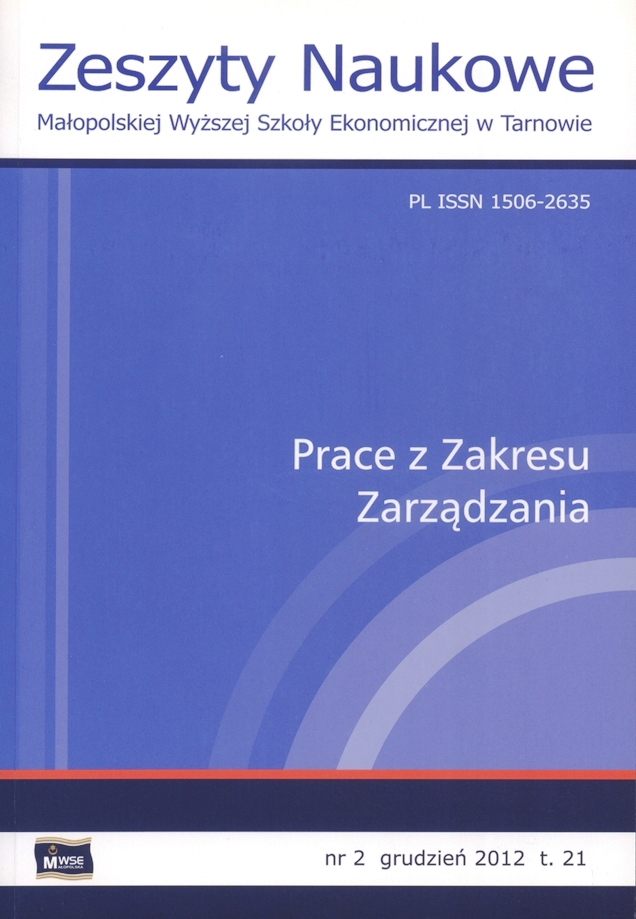Abstract
This article presents the nature and essential features of traditional and e-learning employee training as well as the significance of both methods for development of organizations and their employees. It defines the assessment of effectiveness and efficiency of training and describes financial and behavioural models used to assess efficiency of employee courses and to measure intellectual capital. Among traditional methods applied to assess effectiveness of training the article presents Kirkpatrick’s model, Hamblin’s model, Philips’ method, C-I-P-O technique, and the devised by Karl-Erik Sveiby Intangible Asset Monitor which appropriately modified by adding several indicators proposed in the article may serve in a company to assess e-learning efficiency analysed in the context of multi-criteria assessment of the company’s performance. The mentioned research tools are complemented by presentation of modern solutions, with particular consideration given to Dobija’s financial model of human capital measurement and Choy’s behavioural model devised to assess e-learning efficiency in companies. It has been concluded that the methods may function as autonomous e-learning assessment system. They can also substantially complement the system of measurement of objective nature included for example in the mentioned Intangible Asset Monitor or the Balanced Scorecard method.
References
Andrzejczak A., Od szkolenia do organizacyjnego uczenia się. W: Wiśniewski Z., Pocztowski A. (red.), Zarządzanie zasobami ludzkimi w warunkach nowej gospodarki, Oficyna Ekonomiczna, Kraków 2004. ISBN 83-89355-26-4.
View in Google Scholar
Bednarek J., Lubina E., Kształcenie na odległość. Podstawy metodyki, Wyd. Naukowe PWN, Warszawa 2008. ISBN 978-83-01-15471-4.
View in Google Scholar
Bennink R., Implementing e-Learning from the Corporate Perspective [online, dostęp 18.10.2012], "Training and Development in Australia" 2004, vol. 31, no. 5, s. 6-9. Dostępny w Internecie: http://knowledgetree.flexiblelearning.net.aufedition05/download/Bennik.
View in Google Scholar
Bramley P., Ocena efektywności szkoleń, Dom Wydawniczy ABC, Kraków 2001. ISBN 83-88931-06-7.
View in Google Scholar
Chmiel N., Psychologia pracy i organizacji, Gdańskie Wydawnictwo Psychologiczne, Gdańsk 2003. ISBN 83-89120-11-9.
View in Google Scholar
Choy S., Benefits of e-Learning Benchmarks. Australian Cases Studies, "Electronic Journal of e-Learning" 2007, vol. 5, iss. 1.
View in Google Scholar
Dobija M., Kapitał ludzki i intelektualny w aspekcie teorii rachunkowości, "Przegląd Organizacji" 2002, nr 1.
View in Google Scholar
Kozioł W., Ekonomiczne aspekty edukacji, "Zeszyty Naukowe Małopolskiej Wyższej Szkoły Ekonomicznej w Tarnowie. Prace z zakresu oświaty i wychowania" 2011, nr 1, s. 187-196.
View in Google Scholar
Kunasz M., Ocena efektywności szkolenia w świetle badań, "Studia i Materiały Uniwersytetu Warszawskiego" 2006, nr 1.
View in Google Scholar
Lipka A., Ryzyko personalne. Szanse i zagrożenia zarządzania zasobami ludzkimi, Poltext, Warszawa 2002. ISBN 83-88840-23-1.
View in Google Scholar
Łaguna M., Szkolenia. Jak je prowadzić, by..., Gdańskie Wydawnictwo Psychologiczne, Gdańsk 2004. ISBN 978-83-89120-96-0.
View in Google Scholar
Mayo A., Kształtowanie strategii szkoleń i rozwoju pracowników, Oficyna Ekonomiczna, Kraków 2002. ISBN 83-88597-72-8.
View in Google Scholar
Phillips J.J., Stone R.D., Pulliam Phillips P., Ocena efektywności w zarządzaniu zasobami ludzkimi, Human Factor, Kraków 2003. ISBN 83-918501-0-2.
View in Google Scholar
Piechnik-Kurdziel A., Efektywność szkolenia zawodowego w teorii i praktyce zarządzania personelem, "Zeszyty Naukowe Akademii Ekonomicznej w Krakowie. Prace z zakresu zarządzania zasobami ludzkimi", nr 552, Wydawnictwo Akademii Ekonomicznej, Kraków 2000.
View in Google Scholar
Pocztowski A., Zarządzanie zasobami ludzkimi. Strategie - procesy - metody, Polskie Wydawnictwo Ekonomiczne, Warszawa 2008. ISBN 978-83-208-1662-4.
View in Google Scholar
Sveiby K.-E., Measuring Intangibles and Intellectual Capital - An Emerging First Standard [online, dostęp 18.10.2012], 1998. Dostępny w Internecie: http://www.sveiby.com/articles/Emer-gingStandard.html.
View in Google Scholar
Szczęsna A., Danielewicz D., System szkoleń. W: Rostkowski T. (red.), Nowoczesne metody zarządzania zasobami ludzkimi, Difin, Warszawa 2004. ISBN 83-88597-72-8.
View in Google Scholar
Woźniak J., Metoda Phillipsa jako nowa nadzieja w badaniu efektywności szkoleń. W: Król H. (red.), Ewolucja zarządzania organizacjami na przełomie wieków, Vizja Press & IT, Warszawa 2006. ISBN 83-60283-11-7.
View in Google Scholar
© Copyright by Małopolska School of Economics in Tarnów. The articles are available under the Creative Commons Attribution NonCommercial-NoDerivatives 4.0 International License


